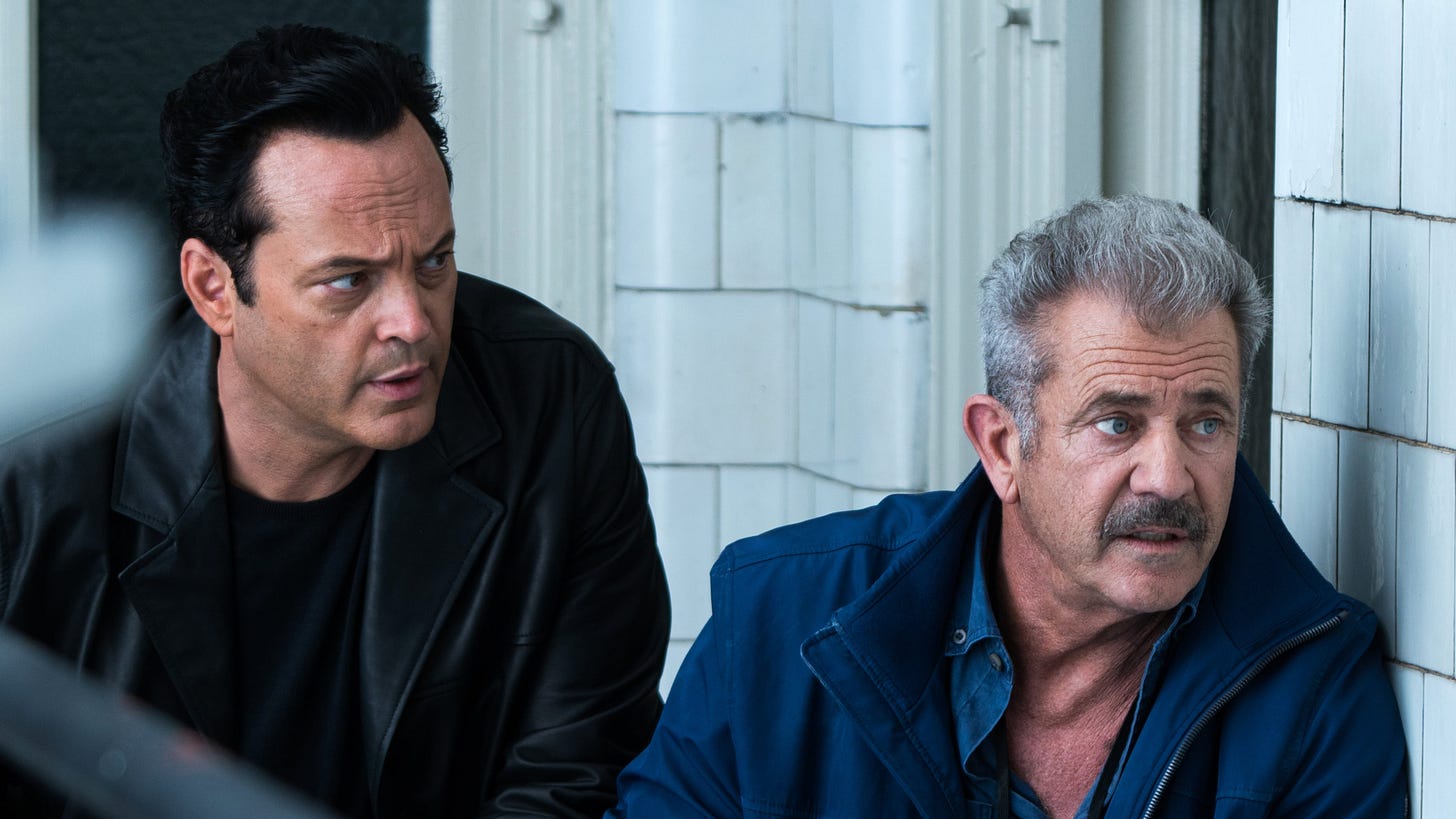“We have the skills and the right to acquire proper compensation.”
— Brett Ridgeman, (Mel Gibson)
What I love best in a crime drama is the combination of great characters and meaningful violence. No one does that better director/writer S. Craig Zahler.
I was bowled over by Zahler's first movie: Bone Tomahawk. He introduced well sketched out characters, led by icon Kurt Russell and all around great actor Richard Jenkins. He was willing to take his time letting you get to know them. Then he gradually and patiently had them descend into an ultra-violent hell.
He followed up with another tough and compelling film supercharged with violent surprises: Riot in Cellblock 99.
Dragged Across Concrete continues the formula of deeply detailed characters and brutal violence.
Detective partners Ridgeman (Mel Gibson) and Lurasetti (Vince Vaughn) find themselves on suspension when their rough handling of a suspect lands on the evening news. They respond to their situation by plotting to rob a professional thief named Vogelman to supplement their limited incomes. Gibson is trying to move his family out of a neighborhood that is sliding into crime and Vaughn wants to propose to his girlfriend.
While Gibson and Vaughn surveils Vogelman, he pulls off a bank heist, where a pregnant cashier is murdered and another taken hostage. The detectives follow the armored car the thieves use to make their escape; they corner them in a deserted garage.
The rest of the movie resolves the stand off with shocking violence and emotional character beats.
The movie includes another major character, Henry Johns (Tory Kittles) a parolee recruited by Vogelman to join him in the bank heist. Johns is the closet thing to a good guy in the film, shown caring for his disabled brother and expressing disgust at the mayhem committed by his partners. He is the only character that gets out of the story unscathed.
What distinguishes Dragged Across Concrete from its predecessors is how vigorously it inhabits the Noir template. I believe that the best noirs take their characters through a downward journey into darkness, a darkness that, in part, comes from within them. And the best noirs end badly for these characters, whether with their deaths or at least leaving them with scars and damage. That certainly describes this film. The darkness is inherent in the characters of two cops who routinely resort to brutality and who respond to discipline by resorting to armed robbery. And the movie does not end well for either of them.
What is meaningful violence?
We've all seen action movies where the stars defy the laws of physics and hordes of henchman are dispatched one at a time. In these movies, the violence is usually sanitized and violence is stereo-typically used by villains against innocents to manipulate the audience into rooting against them. One the other end of the extreme, you have horror movies and exploitation films where violence is extreme and used in the same exploitative way that nudity and sex are used in those same movies.
What I prefer is violence that emerges organically from the characters and story. It is the result of choices made by the characters that result in consequences unexpected or unpredictable. Sometimes the choices are to resort to violence, which has its own consequences. In Dragged Across Concrete, the extreme violence of the gang may have been inherent, but the suffering they inflict on their hostage is the direct result of being confronted by Vaughn and Gibson. It's difficult for the pair to assume the roles of heroes in the story, due to their own background of violence and their mercenary motives.
I have admired the role choices and performances of both Vaughn and Gibson lately. In every case, they help elevate the movies they appear in. Zahler gets the most out of these screen veterans, giving them grounded and fleshed out characters to inhabit.
Finally, some critics have accused Zahler of being a right winger. The crappy clickbait outlet Daily Beast declared that "Mel Gibson's New Police Brutality Movie Is A Vile Racist Right Wing Fantasy." This is patently ridiculous; the most admirable character in the movie (Johns) is black. The worst characters – Vogelman and his henchmen - are white. Vaughn and Gibson's turn to crime is a disastrous failure directly preceded by their police brutality.
Zahler addressed this in an interview with The Ringer. “If you come into a movie and you’re very focused on one thing—like you’re very interested in how people of this ethnicity or people with this belief system or women or children or people from Canada are treated in this movie … that’s your viewpoint,” Zahler says. “And you’re entitled to it. If the most important thing for you to get out of the movie experience is to see a reflection of your personal beliefs, you probably won’t get that with any of my movies because they don’t even consistently line up with themselves.”
In a previous post, I made the argument that classic Film Noir was left-wing in its orientation. You could make an argument - and I would support it - that it was an indictment of the excesses of capitalism. I suppose it would be possible to make a right-wing Film Noir/Neo-Noir; I can't think of one that has been produced off the top of my head. The non-Noir crime films that glorified the police, like The Naked City or Dragnet, could be considered right-wing because they reinforce the moral order. Noir lies on the other side of that worldview. Dragged Across Concrete exemplifies the Noir form. That includes the central pillar of a critique of society and its institutions.
Zahler is not only a powerful, provocative director, but also a heavy metal musician. And if anyone understands us metal heads, you will know we don't generally fall into any neat political categories. So there.




